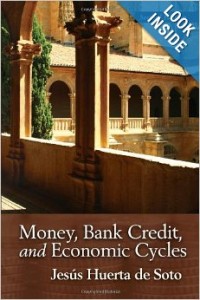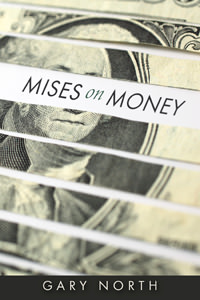Here is part II of de Soto’s impressive summary of the Boom/Bust cycle at work in America. Those who fail to learn from history end up repeating it and American leaders seem intent on not learning from history. LIFE Leadership, on the other hand, is intent on teaching people the principles behind the processes at work within the world. I believe the more truth one applies to life, the more capable he/she becomes in navigating the rough spots.
Sincerely,
At present, numerous self-interested voices are demanding further reductions in interest rates and new injections of money which permit those who desire it to complete their investment projects without suffering losses. Nevertheless, this escape forward would only temporarily postpone problems at the cost of making them far more serious later. The crisis has hit because the profits of capital-goods companies (especially in the building sector and in real-estate development) have disappeared due to the entrepreneurial errors provoked by cheap credit, and because the prices of consumer goods have begun to perform relatively less poorly than those of capital goods.
At this point, a painful, inevitable readjustment begins, and in addition to a decrease in production and an increase in unemployment, we are now still seeing a harmful rise in the prices of consumer goods (stagflation). The most rigorous economic analysis and the coolest, most balanced interpretation of recent economic and financial events support the conclusion that central banks (which are true financial central-planning agencies) cannot possibly succeed in finding the most advantageous monetary policy at every moment. This is exactly what became clear in the case of the failed attempts to plan the former Soviet economy from above.
To put it another way, the theorem of the economic impossibility of socialism, which the Austrian economists Ludwig von Mises and Friedrich A. Hayek discovered, is fully applicable to central banks in general, and to the Federal Reserve—(at one time) Alan Greenspan and (currently) Ben Bernanke—in particular. According to this theorem, it is impossible to organize society, in terms of economics, based on coercive commands issued by a planning agency, since such a body can never obtain the information it needs to infuse its commands with a coordinating nature. Indeed, nothing is more dangerous than to indulge in the “fatal conceit”—to use Hayek’s useful expression—of believing oneself omniscient or at least wise and powerful enough to be able to keep the most suitable monetary policy fine tuned at all times.
Hence, rather than soften the most violent ups and downs of the economic cycle, the Federal Reserve and, to some lesser extent, the European Central Bank, have most likely been their main architects and the culprits in their worsening. Therefore, the dilemma facing Ben Bernanke and his Federal Reserve Board, as well as the other central banks (beginning with the European Central Bank), is not at all comfortable. For years they have shirked their monetary responsibility, and now they find themselves in a blind alley. They can either allow the recessionary process to begin now, and with it the healthy and painful readjustment, or they can escape forward toward a “hair of the dog” cure. With the latter, the chances of even more severe stagflation in the not-too-distant future increase exponentially. (This was precisely the error committed following the stock market crash of 1987, an error which led to the inflation at the end of the 1980s and concluded with the sharp recession of 1990-1992.)
Furthermore, the reintroduction of a cheap-credit policy at this stage could only hinder the necessary liquidation of unprofitable investments and company reconversion. It could even wind up prolonging the recession indefinitely, as has occurred in Japan in recent years: though all possible interventions have been tried, the Japanese economy has ceased to respond to any monetarist stimulus involving credit expansion or Keynesian methods. It is in this context of “financial schizophrenia” that we must interpret the latest “shots in the dark” fired by the monetary authorities (who have two totally contradictory responsibilities: both to control inflation and to inject all the liquidity necessary into the financial system to prevent its collapse).
Thus, one day the Federal Reserve rescues Bear Stearns (and later AIG, Fannie Mae, and Freddie Mac or Citigroup), and the next it allows Lehman Brothers to fail, under the amply justified pretext of “teaching a lesson” and refusing to fuel moral hazard. Then, in light of the way events were unfolding, a 700-billion-dollar plan to purchase the euphemistically named “toxic” or “illiquid” (i.e., worthless) assets from the banking system was approved. If the plan is financed by taxes (and not more inflation), it will mean a heavy tax burden on households, precisely when they are least able to bear it.
Finally, in view of doubts about whether such a plan could have any effect, the choice was made to inject public money directly into banks, and even to “guarantee” the total amount of their deposits, decreasing interest rates to almost zero percent.









